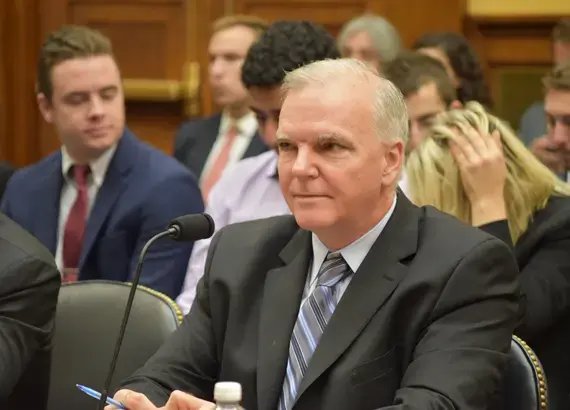
NDI’s Les Campbell testifies in front of the House Foreign Affairs Committee about the importance of democracy and governance programs in the Middle East.
Success Story
“Demands for Freedom and Accountability Did Not End with the Arab Spring” Says NDI’s Les Campbell to Congress
“Democracy and governance promotion efforts are important pieces of securing U.S. interests in the Middle East and North Africa,” said Congresswoman Ileana Ros-Lehtinen (R-FL) who chairs the House Foreign Affairs Subcommittee on the Middle East and North Africa. Ros-Lehtinen presided over a hearing on November 7 entitled “Democracy and Governance in the Middle East and North Africa,” which she considered “an opportunity for Members to hear directly from program implementers about impediments to reforms and what Congress and the administration can do to better achieve democracy and governance goals in the region.”
Democracy and governance promotion efforts are important pieces of securing U.S. interests in the Middle East and North Africa.
-Congresswoman Ileana Ros-Lehtinen
NDI’s Regional Director for the Middle East and North Africa (MENA), Les Campbell, was invited by the House Foreign Affairs Committee (HFAC) to testify about the status of democracy and governance across the MENA region, along with Scott Mastic from International Republican Institute, Zeinab Abdelkarim from International Foundation for Electoral Systems and Robert Herman from Freedom House.
In his opening remarks, Campbell described the current situation of democratic institutions across the Middle East in the aftermath of the Arab Spring uprisings:
“It is sometimes posited that the Arab Spring unleashed a new era of instability in the Middle East by toppling repressive, but ‘stable’ dictators. However, this oft stated thesis collapses under scrutiny as the remaining, supposedly stable regimes are increasingly the locus of conflict and regional disarray. Putting a lie to the ‘dictatorship equals stability’ thesis, the countries that undertook limited democratic reform or were relatively well-governed prior to the 2011 uprisings -- Morocco, Tunisia, Jordan and Lebanon -- have demonstrated resistance to destabilizing forces and continue on a path of limited liberalization, if not deep reform. Countries with long histories of authoritarian government or dictatorship -- Libya, Syria and Egypt -- are in various states of societal and political crisis. In other words, more democratic and open government, where it exists in the Middle East, is actually correlated with the relatively peaceful parts of the region, while authoritarianism and repression have spawned and furthered instability and conflict.”
Given widespread conflict and political unrest in the MENA region, there is often a perception of waning commitment to “reform and modernization.” However, Campbell argued the opposite: “citizens’...demands for accountability and transparency have only begun.” NDI’s work has aimed to fulfill these very demands, with programming focused on development of civic groups, political parties, parliaments and governing institutions, with special attention given to engaging women and youth in the political process. Campbell underscores the importance of NDI’s programs in the Middle East as a “cost-effective way to complement investments in diplomacy and development because if countries fail politically, all other development goals fail -- including trade, health and education.”
Keeping in mind that “the citizens of the MENA region...would prefer gradual change -- with genuine, long lasting reforms,” Campbell made several recommendations, some of which included:
-
“that the U.S. continue to invest in democracy and good governance programs in the countries that have made a long term commitment to reform and which have shown positive results -- including Morocco, Tunisia, Jordan and Lebanon;
-
that countries which are emerging from conflict -- such as Iraq -- enjoy increased support for the strengthening of inclusive institutions and structures of governance which will help ensure that extremists do not regain a foothold, and
-
that democrats and local activists in countries in conflict like Yemen, Syria and Libya continue to enjoy the support of the U.S. government as they strive to create and sustain ‘democratic subcultures’ at the local level while waiting for a national peace.”
It was clear that the Representatives present agreed that democracy and governance programs in the Middle East are critical for international stability and U.S. national security. More specifically, Representative Gerald Connolly (D-VA) emphasized that it is not just IRI and NDI’s “specific programs on the ground,” but the “nexus” they create through their presence: “an NGO, civic engagement and business nexus” that is attracted to “this magnet of democracy building.” In order for the United States to continue to protect its interests in the MENA region, we must continue to protect our democracy programs there as well.
See Les Campbell’s full testimony here.



